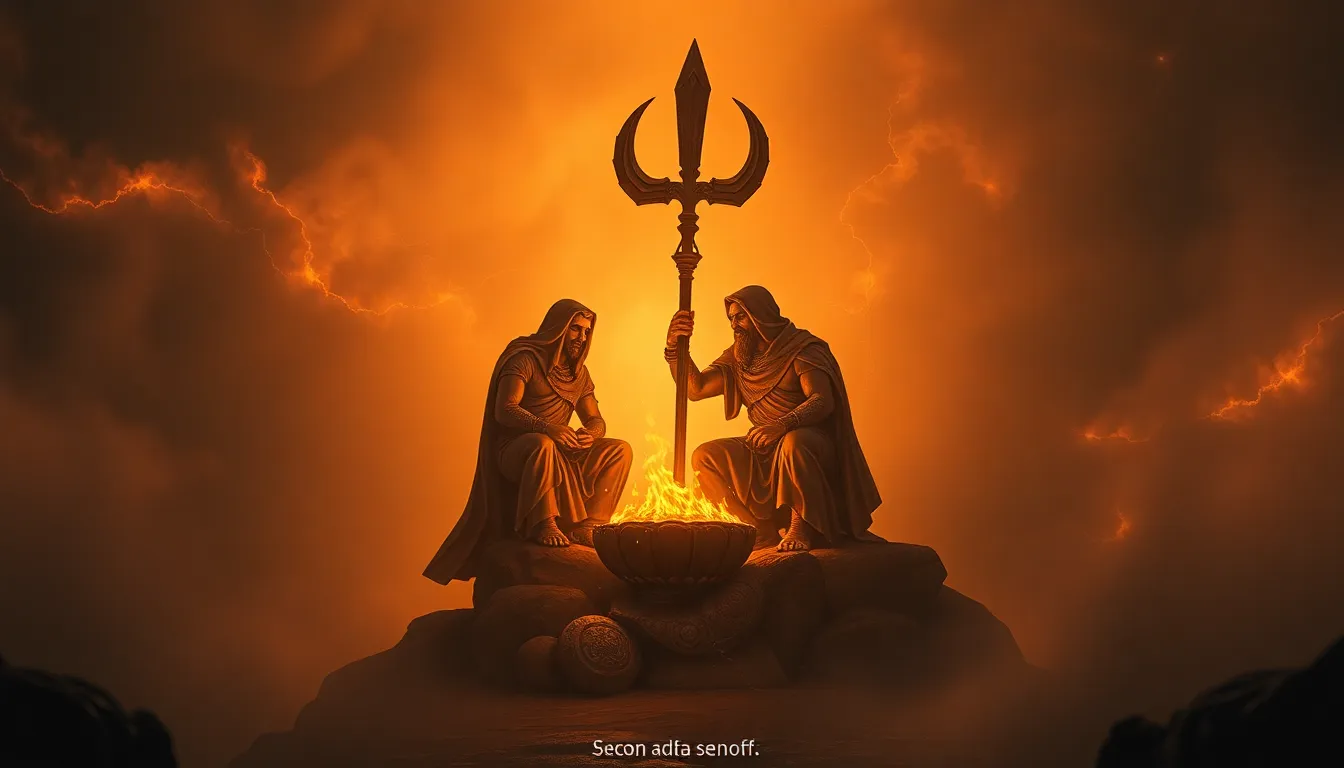Moral Myths and the Nature of Sacrifice: Lessons from Legends
I. Introduction to Moral Myths
Moral myths are foundational stories that convey ethical principles and societal values through narrative. They often serve as a vehicle for exploring complex moral questions and dilemmas, shaping the way cultures understand concepts such as justice, loyalty, and sacrifice.
These myths play a crucial role in cultural narratives, offering insights into the human experience and the moral frameworks that guide behavior. From ancient tales to modern reinterpretations, the stories we tell about sacrifice reveal much about our collective values and aspirations.
This article will explore the nature of sacrifice in various cultures, examining how these stories illustrate the moral lessons inherent in acts of giving, loss, and redemption.
II. The Concept of Sacrifice in Mythology
Historically, sacrifice has been a significant theme in mythology, often associated with ideas of devotion, penance, and the greater good. The different forms of sacrifice can be categorized into three types:
- Ritual Sacrifice: These are ceremonial acts performed to appease deities or spirits, often involving offerings or the symbolic giving up of something valuable.
- Personal Sacrifice: This type involves individuals giving up their own comfort or desires for the sake of others, reflecting deep emotional bonds.
- Communal Sacrifice: In this context, a community collectively engages in acts of sacrifice, often as a means of fostering unity or responding to shared challenges.
The psychological and social roles of sacrifice in society are profound. Sacrifice can reinforce social bonds, facilitate empathy among individuals, and establish norms of behavior that promote altruism and cooperation.
III. Legends of Sacrifice: Case Studies
Various cultures provide rich narratives illustrating the concept of sacrifice. Here are a few prominent examples:
A. Greek mythology: The sacrifice of Iphigenia
Iphigenia, the daughter of Agamemnon, was sacrificed to appease the goddess Artemis, allowing the Greek fleet to sail to Troy. This story raises questions about duty, family loyalty, and the moral cost of leadership.
B. Norse mythology: The sacrifice of Odin
Odin, the All-Father, hung himself from the World Tree, Yggdrasil, for nine nights to gain wisdom and knowledge. This self-sacrifice underscores the idea that true understanding often requires personal loss or suffering.
C. Hindu mythology: The story of Raja Harishchandra
Raja Harishchandra is celebrated for his unwavering commitment to truth and justice, even at the expense of his own life and the lives of his family. His story illustrates the moral imperative of sacrifice for the greater good.
IV. Moral Lessons from Sacrificial Myths
The narratives of sacrifice often convey profound moral lessons:
- The value of selflessness and altruism: Many myths highlight the importance of putting others before oneself, fostering a sense of community and connection.
- The consequences of sacrifice on personal identity: Characters in these myths often undergo transformations, reflecting how sacrifice can redefine one’s sense of self.
- The ethical dilemmas presented in these narratives: The conflicts faced by characters prompt readers to question their own values and the complexities of moral decision-making.
V. Sacrifice and Redemption in Contemporary Stories
Modern retellings of ancient myths continue to explore themes of sacrifice. Popular culture, particularly in film and literature, has embraced these narratives:
- The Hunger Games: Katniss Everdeen volunteers to take her sister’s place in a deadly competition, showcasing personal sacrifice for family.
- Harry Potter: The series emphasizes the sacrifices made by Harry’s parents and friends, illustrating the enduring power of love and loyalty.
These contemporary stories resonate with audiences, reinforcing the ongoing relevance of sacrifice in today’s moral discussions.
VI. The Role of Sacrifice in Religious Contexts
Religious narratives often intertwine with the theme of sacrifice:
A. Sacrifice in Christianity: The story of Jesus
In Christianity, the crucifixion of Jesus is the ultimate act of sacrifice, embodying themes of redemption, love, and forgiveness.
B. Sacrificial themes in Buddhism and Hinduism
Buddhism emphasizes the importance of letting go of attachments, while Hinduism’s various deities often exhibit acts of sacrifice for the welfare of others.
C. Comparative analysis of sacrifice across religions
Across various faiths, the theme of sacrifice serves as a bridge between the divine and the human, illustrating how moral and ethical values transcend cultural boundaries.
VII. Psychological Insights into the Nature of Sacrifice
The motivations behind sacrificial acts can be complex:
- Empathy and connection: Sacrifice often stems from a deep understanding of others’ suffering, fostering a sense of solidarity.
- The impact on mental health and well-being: Engaging in acts of sacrifice can enhance feelings of purpose and fulfillment, contributing positively to mental health.
VIII. Critiques and Alternative Perspectives on Sacrifice
Despite the noble portrayals of sacrifice, critiques exist:
- Ethical criticisms: Some argue that traditional narratives glorify suffering and may promote unhealthy expectations of self-sacrifice.
- Non-sacrificial approaches: Alternative moral frameworks advocate for empathy and understanding without the need for personal loss.
- Contemporary movements: Advocating for social justice, these movements often challenge the necessity of sacrifice, seeking collaborative solutions instead.
IX. Lessons from Legends: Applications in Modern Life
Moral myths continue to influence personal decision-making and societal values:
- Leadership and community service: The ideals embodied in sacrificial narratives can inspire leaders to prioritize the common good over personal gain.
- Inspiration for social change: Myths can motivate individuals and communities to advocate for justice and support one another in times of need.
X. Conclusion: Reflecting on Sacrifice and Morality
This exploration of myths surrounding sacrifice reveals key insights into the human experience. The enduring power of these legends lies in their ability to shape moral frameworks and inspire action.
As we reflect on the lessons from these narratives, it becomes evident that embracing the ideals of sacrifice can lead to a more compassionate and just society. In a world often fraught with division, the call to selflessness and empathy remains ever relevant.



